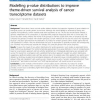Free Online Productivity Tools
i2Speak
i2Symbol
i2OCR
iTex2Img
iWeb2Print
iWeb2Shot
i2Type
iPdf2Split
iPdf2Merge
i2Bopomofo
i2Arabic
i2Style
i2Image
i2PDF
iLatex2Rtf
Sci2ools
114
click to vote
BMCBI
2010
2010
Modelling p-value distributions to improve theme-driven survival analysis of cancer transcriptome datasets
Background: Theme-driven cancer survival studies address whether the expression signature of genes related to a biological process can predict patient survival time. Although this should ideally be achieved by testing two separate null hypotheses, current methods treat both hypotheses as one. The first test should assess whether a geneset, independent of its composition, is associated with prognosis (frequently done with a survival test). The second test then verifies whether the theme of the geneset is relevant (usually done with an empirical test that compares the geneset of interest with random genesets). Current methods do not test this second null hypothesis because it has been assumed that the distribution of p-values for random genesets (when tested against the first null hypothesis) is uniform. Here we demonstrate that such an assumption is generally incorrect and consequently, such methods may erroneously associate the biology of a particular geneset with cancer prognosis. Re...
| Added | 08 Dec 2010 |
| Updated | 08 Dec 2010 |
| Type | Journal |
| Year | 2010 |
| Where | BMCBI |
| Authors | Esteban Czwan, Benedikt Brors, David Kipling |
Comments (0)

